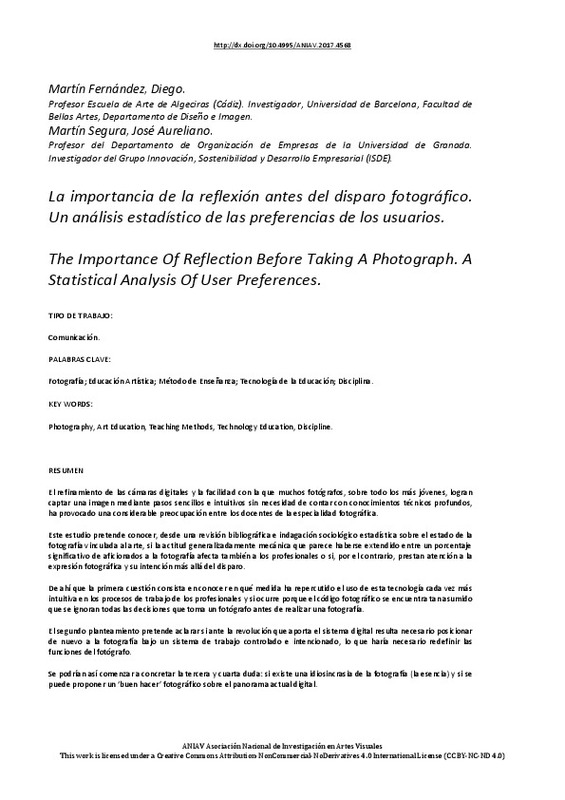JavaScript is disabled for your browser. Some features of this site may not work without it.
Buscar en RiuNet
Listar
Mi cuenta
Estadísticas
Ayuda RiuNet
Admin. UPV
La importancia de la reflexión antes del disparo fotográfico. Un análisis estadístico de las preferencias de los usuarios
Mostrar el registro completo del ítem
Martín Fernández, D.; Martín Segura, J. (2017). La importancia de la reflexión antes del disparo fotográfico. Un análisis estadístico de las preferencias de los usuarios. En Glocal [codificar, mediar, transformar, vivir] III Congreso Internacional de Investigación en Artes Visuales. Editorial Universitat Politècnica de València. 415-422. https://doi.org/10.4995/ANIAV.2017.4568
Por favor, use este identificador para citar o enlazar este ítem: http://hdl.handle.net/10251/106442
Ficheros en el ítem
Metadatos del ítem
| Título: | La importancia de la reflexión antes del disparo fotográfico. Un análisis estadístico de las preferencias de los usuarios | |
| Otro titulo: |
|
|
| Autor: | Martín Fernández, Diego Martín Segura, José | |
| Fecha difusión: |
|
|
| Resumen: |
[EN] The refinement of digital cameras and the ease with which many photographers, especially younger ones, manage to capture an image by means of simple and intuitive steps, without the need for detailed technical knowledge, ...[+]
[ES] El refinamiento de las cámaras digitales y la facilidad con la que muchos fotógrafos, sobre todo los más jóvenes, logran captar una imagen mediante pasos sencillos e intuitivos sin necesidad de contar con conocimientos ...[+]
|
|
| Palabras clave: |
|
|
| Derechos de uso: | Reconocimiento - No comercial - Sin obra derivada (by-nc-nd) | |
| ISBN: |
|
|
| Fuente: |
|
|
| DOI: |
|
|
| Editorial: |
|
|
| Versión del editor: | http://ocs.editorial.upv.es/index.php/ANIAV/ANIAV2017/paper/view/4568 | |
| Título del congreso: |
|
|
| Lugar del congreso: |
|
|
| Fecha congreso: |
|
|
| Tipo: |
|








